8/10/2013, 7:09:00 AM · by SeekAndFind · 317 replies
Washington Examiner ^ | 08/10/2013 | Timothy Carney
Posted on 08/06/2023 7:01:59 PM PDT by SeekAndFind
The anniversaries of the atomic bombings of Hiroshima and Nagasaki present an opportunity to demolish a cornerstone myth of American history — that those twin acts of mass civilian slaughter were necessary to bring about Japan’s surrender, and spare a half-million US soldiers who’d have otherwise died in a military conquest of the empire’s home islands.
Those who attack this mythology are often reflexively dismissed as unpatriotic, ill-informed or both. However, the most compelling witnesses against the conventional wisdom were patriots with a unique grasp on the state of affairs in August 1945 — America’s senior military leaders of World War II.
Let’s first hear what they had to say, and then examine key facts that led them to their little-publicized convictions:
General Dwight Eisenhower on learning of the planned bombings: “I had been conscious of a feeling of depression and voiced to [Secretary of War Stimson] my grave misgivings, first on the basis of my belief that Japan was already defeated and that dropping the bomb was completely unnecessary, and secondly because I thought that our country should avoid shocking world opinion by the use of a weapon whose employment was, I thought, no longer mandatory as a measure to save American lives. It was my belief that Japan was, at that very moment, seeking some way to surrender with a minimum loss of ‘face’.”
Admiral William Leahy, Truman's Chief of Staff: “The use of this barbarous weapon…was of no material assistance in our war against Japan. The Japanese were already defeated and ready to surrender because of the effective sea blockade and the successful bombing with conventional weapons.”
Major General Curtis LeMay, 21st Bomber Command: “The war would have been over in two weeks without the Russians entering and without the atomic bomb…The atomic bomb had nothing to do with the end of the war at all.”
General Hap Arnold, US Army Air Forces: “The Japanese position was hopeless even before the first atomic bomb fell, because the Japanese had lost control of their own air.” “It always appeared to us that, atomic bomb or no atomic bomb, the Japanese were already on the verge of collapse.”
Ralph Bird, Under Secretary of the Navy: “The Japanese were ready for peace, and they already had approached the Russians and the Swiss…In my opinion, the Japanese war was really won before we ever used the atom bomb.”
Brigadier General Carter Clarke, military intelligence officer who prepared summaries of intercepted cables for Truman: “When we didn’t need to do it, and we knew we didn’t need to do it…we used [Hiroshima and Nagasaki] as an experiment for two atomic bombs. Many other high-level military officers concurred.”
Fleet Admiral Chester Nimitz, Pacific Fleet commander: “The use of atomic bombs at Hiroshima and Nagasaki was of no material assistance in our war against Japan. The Japanese were already defeated and ready to surrender.”
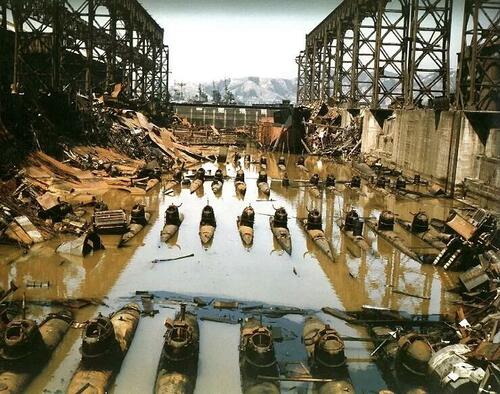
Putting out feelers through third-party diplomatic channels, the Japanese were seeking to end the war weeks before the atomic bombings on August 6 and 9, 1945. Japan’s navy and air forces were decimated, and its homeland subjected to a sea blockade and allied bombing carried out against little resistance.
The Americans knew of Japan’s intent to surrender, having intercepted a July 12 cable from Japanese Foreign Minister Shigenori Togo, informing Japanese ambassador to Russia Naotake Sato that “we are now secretly giving consideration to the termination of the war because of the pressing situation which confronts Japan both at home and abroad.”
Togo told Sato to “sound [Russian diplomat Vyacheslav Molotov] out on the extent to which it is possible to make use of Russia in ending the war.” Togo initially told Sato to obscure Japan’s interest in using Russia to end the war, but just hours later, he withdrew that instruction, saying it would be “suitable to make clear to the Russians our general attitude on ending the war”— to include Japan’s having “absolutely no idea of annexing or holding the territories which she occupied during the war.”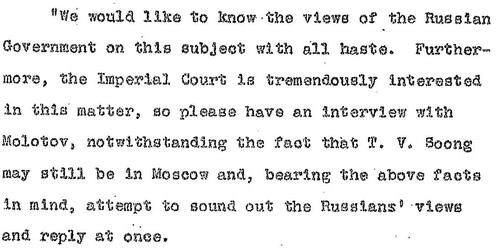
An excerpt from a July 12, 1945 US War Department summary of an intercepted cable from Japanese Foreign Minister Shigenori Togo to his ambassador to Russia
Japan’s central concern was the retention of its emperor, Hirohito, who was considered a demigod. Even knowing this — and with many US officials feeling the retention of the emperor could help Japanese society through its postwar transition —the Truman administration continued issuing demands for unconditional surrender, offering no assurance that the emperor would be spared humiliation or worse.
In a July 2 memorandum, Secretary of War Henry Stimson drafted a terms-of-surrender proclamation to be issued at the conclusion of that month’s Potsdam Conference. He advised Truman that, “if…we should add that we do not exclude a constitutional monarchy under her present dynasty, it would substantially add to the chances of acceptance.”
Truman and Secretary of State James Byrnes, however, continued rejecting recommendations to give assurances about the emperor. The final Potsdam Declaration, issued July 26, omitted Stimson’s recommended language, sternly declaring, “Following are our terms. We will not deviate from them.”
One of those terms could reasonably be interpreted as jeopardizing the emperor: “There must be eliminated for all time the authority and influence of those who have deceived and misled the people of Japan into embarking on world conquest.”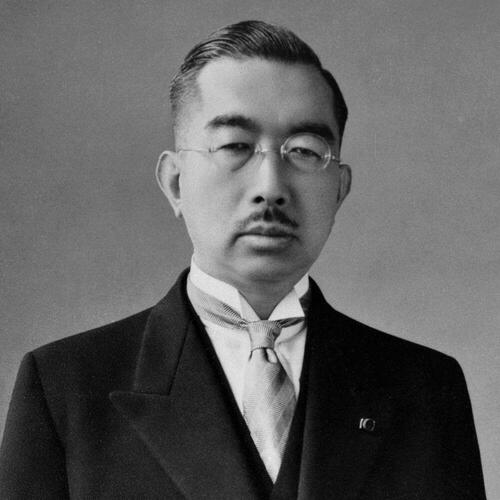
Japanese emperor Hirohito reigned from 1926 to 1989
At the same time the United States was preparing to deploy its formidable new weapons, the Soviet Union was moving armies from the European front to northeast Asia.
In May, Stalin told the US ambassador that Soviet forces should be positioned to attack the Japanese in Manchuria by August 8. In July, Truman predicted the impact of the Soviets opening a new front. In a diary entry made during the Potsdam Conference, he wrote that Stalin assured him “he’ll be in the Jap War on August 15th. Fini Japs when that comes about.”
Right on Stalin’s original schedule, the Soviet Union declared war on Japan two days after the August 6 bombing of Hiroshima. That same day — August 8 — Emperor Hirohito told the country’s civilian leaders that he still wanted to pursue a negotiated surrender that would preserve his reign.
On August 9, Soviet attacks commenced on three fronts. News of Stalin’s invasion of Manchuria prompted Hirohito to call a new meeting to discuss surrender — at 10 am, one hour before the strike on Nagasaki. The final surrender decision came on August 10.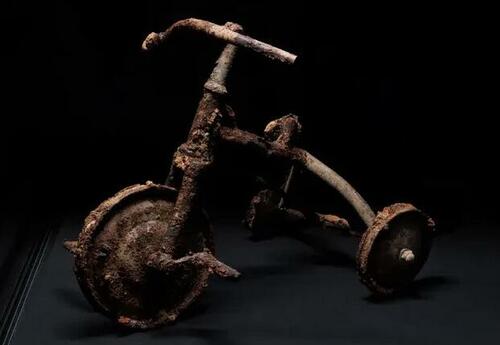
Three-year old Shinichi Tetsutani, burned as he was riding this tricycle when the atomic bomb hit Hiroshima, died a painful death that night (Hiroki Kobayashi/National Geographic)
The Soviet timeline makes the atomic bombings all the more troubling: One would think a US government that’s appropriately hesitant to incinerate and irradiate hundreds of thousands of civilians would want to first see how a Soviet declaration of war affected Japan’s calculus.
As it turns out, the Japanese surrender indeed appears to have been prompted by the Soviet entry into the war on Japan — not by the atomic bombs. “The Japanese leadership never had photo or video evidence of the atomic blast and considered the destruction of Hiroshima to be similar to the dozens of conventional strikes Japan had already suffered,” wrote Josiah Lippincott at The American Conservative.
Sadly, the evidence points to a US government determined to drop atomic bombs on Japanese cities as an end in itself, to such an extent that it not only ignored Japan’s interest in surrender, but worked to ensure that surrender was delayed until after upwards of 210,000 people — disproportionately women, children and elderly — were killed in the two cities.
Make no mistake: This was a deliberate targeting of civilian populations. Hiroshima and Nagasaki were chosen because they were pristine, and could thus fully showcase the bombs’ power. Hiroshima was home to a small military headquarters, but the fact that both cities had gone untouched by a strategic bombing campaign that began 14 months earlier certifies their military and industrial insignificance.
“The Japanese were ready to surrender and it wasn’t necessary to hit them with that awful thing,” Eisenhower would later say. “I hated to see our country be the first to use such a weapon.”
According to his pilot, General Douglas MacArthur, commander of US Army Forces Pacific, was “appalled and depressed by this Frankenstein monster.”
“When I asked General MacArthur about the decision to drop the bomb,” wrote journalist Norman Cousins, “I was surprised to learn he had not even been consulted…He saw no military justification for the dropping of the bomb. The war might have ended weeks earlier, he said, if the United States had agreed, as it later did anyway, to the retention of the institution of the emperor.”
What then, was the purpose of devastating Hiroshima and Nagasaki with atomic bombs?
A key insight comes from Manhattan Project physicist Leo Szilard. In 1945, Szilard organized a petition, signed by 70 Manhattan Project scientists, urging Truman not to use atomic bombs against Japan without first giving the country a chance to surrender, on terms that were made public.
In May 1945, Szilard met with Secretary of State Byrnes to urge atomic restraint. Byrnes wasn’t receptive to the plea. Szilard — the scientist who’d drafted the pivotal 1939 letter from Albert Einstein urging FDR to develop an atomic bomb — recounted:
"[Byrnes] was concerned about Russia's postwar behavior. Russian troops had moved into Hungary and Rumania, and Byrnes thought it would be very difficult to persuade Russia to withdraw her troops from these countries, that Russia might be more manageable if impressed by American military might, and that a demonstration of the bomb might impress Russia."
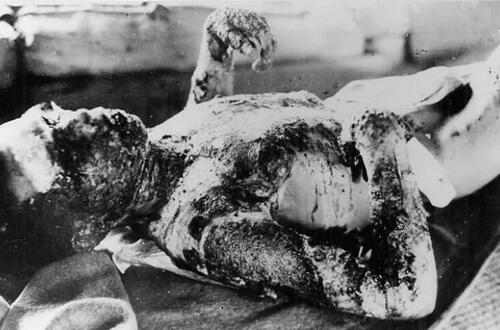
Whether the atomic bomb’s audience was in Tokyo or Moscow, some in the military establishment championed alternative ways to demonstrate its power.
Lewis Strauss, Special Assistant to the Navy Secretary, said he proposed “that the weapon should be demonstrated over… a large forest of cryptomeria trees not far from Tokyo. The cryptomeria tree is the Japanese version of our redwood… [It] would lay the trees out in windrows from the center of the explosion in all directions as though they were matchsticks, and, of course, set them afire in the center. It seemed to me that a demonstration of this sort would prove to the Japanese that we could destroy any of their cities at will.”
Strauss said Navy Secretary Forrestal “agreed wholeheartedly,” but Truman ultimately decided an optimal demonstration required burning hundreds of thousands of noncombatants and laying waste to their cities. The buck stops there.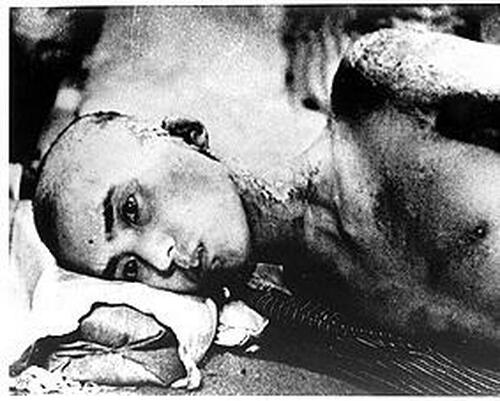
A victim of the atomic bomb
The particular means of inflicting these mass murders — a solitary object dropped from a plane at 31,000 feet — helps warp Americans’ evaluation of its morality. Using an analogy, historian Robert Raico cultivates ethical clarity:
“Suppose that, when we invaded Germany in early 1945, our leaders had believed that executing all the inhabitants of Aachen, or Trier, or some other Rhineland city would finally break the will of the Germans and lead them to surrender. In this way, the war might have ended quickly, saving the lives of many Allied soldiers. Would that then have justified shooting tens of thousands of German civilians, including women and children?”
The claim that dropping the atomic bombs saved a half-million American lives is more than just empty: Truman’s stubborn refusal to provide advance assurances about the retention of Japan’s emperor arguably cost American lives.
That’s true not only of a war against Japan that lasted longer than it needed to, but also of a Korean War precipitated by the US-invited Soviet invasion of Japanese-held territory in northeast Asia. More than 36,000 US service members died in the Korean War — among a staggering 2.5 million total military and civilian dead on both sides of the 38th Parallel.
We like to think of our system as one in which the supremacy of civilian leaders acts as a rational, moderating force on military decisions. The needless atomic bombing of Hiroshima and Nagasaki — against the wishes of World War II’s most revered military leaders — tells us otherwise.
Sadly, the destructive effects of the Hiroshima myth aren’t confined to Americans’ understanding of events in August 1945. “There are hints and notes of the Hiroshima myth that persist all through modern times,” State Department whistleblower and author Peter Van Buren said on The Scott Horton Show.
The Hiroshima myth fosters a depraved indifference to civilian casualties associated with US actions abroad, whether it’s women and children slaughtered in a drone strike in Afghanistan, hundreds of thousands dead in an unwarranted invasion of Iraq, or a baby who dies for lack of imported medicine in US-sanctioned Iran.
Ultimately, to embrace the Hiroshima myth is to embrace a truly sinister principle: That, in the correct circumstances, it’s right for governments to intentionally harm innocent civilians. Whether the harm is inflicted by bombs or sanctions, it’s a philosophy that mirrors the morality of al Qaeda.
That’s not the only thread connecting 1945 to 2023, as Truman’s insistence on unconditional surrender is echoed by the Biden administration’s utter disinterest in pursuing a negotiated peace in Ukraine.
Today, confronting an adversary with 6,000 nuclear warheads — each a thousand times more powerful than the bombs dropped on Japan — Biden’s own stubborn perpetuation of war puts us all at risk of sharing the fate of Hiroshima and Nagasaki’s innocents.
Many thanks for this info!
I wouldn't trust one single word, not even an "and" or "is", from this group!
First good laugh from this thread (besides the OP).
Perfect!
The good one from the other thread (see my link just above) was feckless’:
“I figure we owe them at least one more for Yoko Ono.”
If the Japanese were on the verge of collapse and surrender, then why did it take two? After seeing the damage caused by the first drop, why did they not surrender then? Did the Japanese so disvalue the lives of their citizens, that they dragged their feet untl the second one dropped?
Not only that, but Eisenhower - before being elected President - let it be known that he was willing to nuke North Korea to end that war.
My theory, the US needed to prove to the world that we had a nuclear weapon and it was massively destructive. Without those cities being the test case, many in the world would doubt that the US had nuclear weapons and their power. Nothing says WOW like one plane, one bomb and one destroyed city!
I would think the comments were taken out of context.
Don’t forget that many of their soldiers, in outposts, NEVER gave up at all!
There is no such thing as an “innocent civilian”. A soldier is no more culpable for mankind’s evils than any civilian.
My mother’s oldest brother, an enlisted Marine being “worked up” to invade Japan thought the Hiroshima/Nagasaki A bombs were a great idea!
Having made several landings in the Pacific and surviving Guadalcanal, my uncle thought President Truman was a smart, brave President!
He credited President Truman with saving his life!
As I remember there was a half million japanese troops on the mainline of china.
Had the bombs not gone off the troops would have gone on fighting
“They also sent a warning to the soviets.’s”
Let’s say all of these quotes are correct, and that the Japs were “already finished”. (I wonder if shortly after D-Day, when Germany surely knew that they were “finished” if we should have just stood by and waited for the end?)
I would suggest that dropping the two bombs was still necessary to keep the Soviets at bay, as well as others over the years.
If we hadn’t used them, would they have been more apt to have been used during the Cold War? It is one thing to have the scientists do tests in the desert or some island in the Pacific. It is quite another for the politicians and humanity to see the actual results.
And if we used them once, the Soviets had to think that we would use them again.
I’m sure somebody already pointed it out, but if we had just waited Japan out, the Soviets probably would have gone in first and taken it for themselves.
Quotes (if indeed they are actual quotes) from those not actually fighting the Japs on their own islands. Desk warmers, if able commanders. None with any direct experience fighting the Japs.
Anyone get a veteran of the Okinawa campaign saying the same thing?
Not one single additional American life if we had a way to destroy them.
My uncle was with the Air Force and was some sort of tech guy (radios, radar?) and was on Iwo Jima a couple days after they landed trying to get the runways going.
“Wow? Just two days?”
“Yeah - but the Marines had cleared all the Japs out. Well, sometimes they would snipe at us from the other side of the runway, but they were lousy shots.”
He stayed in that line of work and worked with NASA, etc.
Never mentioned by the no bombs crowd is how many sailors would have died from kamikaze attacks in ships assigned to the naval blockade which was part of their plan. Would have been several thousand before the first boot was planted on mainland Japan.
Back in the late 80's, I was doing research on the 54th and 55th Massachusetts Infantry Regiments in the Civil War. I managed to track down the great- nephew of Robert Gould Shaw, who was the Colonel of the 54th, and died on Morris Island, S.C. on July 18, 1863. To make a long story short, the relative happened to be an elderly Episcopalian Priest named Robert Shaw Sturgis Whitman, who lived in Lenox, Mass., same place that Colonel Shaw's widow was buried. I told him of my interest in Shaw, and he invited me to visit him at him home in Lenox. What an interesting person, and family history. Besides his relationship to R.G. Shaw, Shaw's sister Ellen, who had also lived in Lenox, and who Rev. Whitman remembered visiting as a little boy, was married to General Francis Channing Barlow, of Gettysburg fame (Barlow's Knoll), and later NY State Attorney General who defeated the Boss Tweed Ring. She was his second wife. As well, his father's sister had married Anthony McAuliffe. At the time, I hadn't heard of him, so he told me about the General's "Nuts" message to the Germans. I've since honed-up on my WWII history.
I also learned that Rev. Whitman's father and grandfather had been prominent surgeons in NY City.
Rev. Whitman had paintings of his father, grandfather and great-grandfather hanging on the walls in his dining room. He kindly let me take photos of them. His great-grandfather was Colonel Royal Emerson Whitman, connected with the Camp Grant Massacre in Tucson, Arizona in 1871. A group of vigilante civilians with the help of Mexican Indians attacked a settlement of Pinal and Aravaipa Apaches who had surrendered to the United States Army at Camp Grant, Arizona. After the attack, Whitman tried in vain to bring the perpetrators to justice, but all for nought. It took the jury a very short time to acquit the group of 100 individuals. Whitman is also known for the invention of the Whitman Saddle. Before the Civil War, he was a manufacturer of saddles. He is buried in Arlington Cemetery. His headstone was completed by Gutzon Borglum, sculptor of Mt. Rushmore. Here's Whitman's wikipedia page if you're interested:
And here is the wikipedia page to the Camp Grant Massacre:
I can also recommend the book: "Vast Domain of Blood by by Don Schellie (1968).
The Japanese defense of their homeland would have been devastating for their population. During the island campaign (and there are revisionist anti-American propagandist liars who claim the island-hopping was unnecessary) Japanese KIAs were usually 99+ percent (on Iwo, fewer than 100 of the 20,000+ Japanese forces survived).
US/UK/USSR losses in the annihilation (genocide) of the Japanese population would have been somewhere north of a million.
Incendiary bombing in the last months of the war basically burned to the ground 45 Japanese cities -- and Japan didn't surrender. So, a single nuke dropped on Hiroshima destroyed it, largely through the fire (the city was mostly nicely carved wooden structures) -- and Japan didn't surrender.
It took a second nuke to finally convince the figurehead emperor to grow a pair and order the surrender.
👍🏻 Thanks!!
So how do they explain why Japan didn’t surrender after the first A-bomb?
Don’t believe these quotes anyway.
‘It wasn’t necessary to hit them with that awful thing’ --- Why dropping the A-Bombs was wrong
Disclaimer: Opinions posted on Free Republic are those of the individual posters and do not necessarily represent the opinion of Free Republic or its management. All materials posted herein are protected by copyright law and the exemption for fair use of copyrighted works.